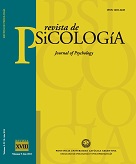Please use this identifier to cite or link to this item:
https://repositorio.uca.edu.ar/handle/123456789/6226| Título: | Education a la prosocialite comme instrument de cohesion sociale au Rwanda Prosocial Education as an instrument of Social Cohesion in Rwanda |
Autor: | Dushimimana, Fidèle | Palabras clave: | EDUCACION; CONDUCTA PROSOCIAL; COHESION SOCIAL; NIÑOS; ESCUELA PRIMARIA; RESOLUCION DE PROBLEMAS | Fecha de publicación: | 2013 | Editorial: | Pontificia Universidad Católica Argentina. Facultad de Psicología y Psicopedagogía. Departamento de Psicología | Cita: | Dushimimana, F. Education a la prosocialite comme instrument de cohesion sociale au Rwanda [en línea]. Revista de Psicología. 2013, 9(18). Disponible en: https://repositorio.uca.edu.ar/handle/123456789/6226 | Resumen: | Abstract: Prosocial behaviors are considered incompatible with violence and aggressiveness and contribute to efficient reciprocity, solidarity and social cohesion. This study aims at applying and assessing the effects of Interpersonal Prosocial Cognitive Problem Solving, a program for promoting prosocial behavior among young Rwandan children attending primary school. The program participants are 118 pupils divided into four classes of which two form an experimental group (n = 59) and two others a control group (n = 59). Pre- and post-tests were administered. The results of this study showed that the children who took part in the program acquired skills for solving interpersonal problems by way of adopting prosocial strategy and significantly increased their prosocial behaviors. The results of this study can have direct repercussions on future research initiatives in the fields of promotion of social cohesion, as well as of policy making Resumen: Se considera que las conductas prosiciales son incompatibles con violencia y agresión y contribuyen a la reciprocidad, solidaridad y a la cohesión social. El objetivo de este estudio es aplicar y evaluar el programa Interpersonal Prosocial Cognitivo de Resolución de Problemas, el cual busca promover la conducta prosocial en niños de Rwanda que cursan la escuela primaria. Participaron 118 alumnos divididos en cuatro clases, de los cuales dos formaron el grupo control (n = 59) y dos conformaron el grupo experimental (n = 59). Se administraron pre y post tests. Los resultados muestran que los niños que pariticiparon del programa aumentaron sus conductas prosociales y adquirieron habilidades para la resolución de problemas interpersonales. Los resultados pueden tener implicancias tanto para investigaciones futuras en el campo de la promoción de cohesión social así como en el diseño de políticas |
Cobertura Espacial: | Ruanda | URI: | https://repositorio.uca.edu.ar/handle/123456789/6226 | ISSN: | 1669-2438 2469-2050 (online) |
Disciplina: | PSICOLOGIA | Derechos: | Acceso Abierto | Fuente: | Revista de Psicología. 2013, 9(18) |
| Appears in Collections: | RdP - 2013 Vol. 9 nro. 18 |
Files in This Item:
| File | Description | Size | Format | |
|---|---|---|---|---|
| education-prosocialite-cohesion-sociale.pdf | 143,99 kB | Adobe PDF |  View/Open |
Page view(s)
135
checked on Apr 30, 2024
Download(s)
112
checked on Apr 30, 2024
Google ScholarTM
Check
This item is licensed under a Creative Commons License

